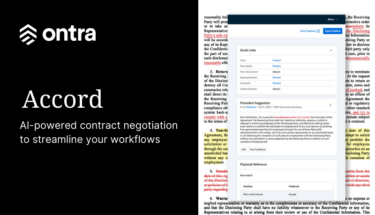Private equity and venture capital firms, direct lenders, investment banks, and other private markets firms execute many non-disclosure agreements (NDAs) each year. How they handle those contracts can differ considerably. Some require their in-house business professionals to handle NDA negotiations, which can be a new and intimidating prospect for a junior analyst or associate.
This article will help business professionals without a legal background become more familiar with NDAs should these contracts come across their desks.
What is an NDA?
An NDA is a binding contract between at least two parties stating that one or more parties will keep the information disclosed to them confidential. An NDA is often a standalone contract; however, parties can also include an NDA provision within a broader agreement.
Organizations typically use NDAs to protect sensitive information in contemplation of, during, and after a business transaction, such as evaluating a purchase of software or services or an acquisition of a business or its assets. Individuals may use NDAs to protect their personal information.
In the private markets: Alternative asset managers, such as private equity firms and investment banks, sign transactional NDAs with other parties to ensure business information remains confidential during due diligence of a potential investment, merger, acquisition, sale, or financing transaction.
Is an NDA the same as a confidentiality agreement?
Yes, and many people use NDAs and confidentiality agreements interchangeably.
There are jurisdictional differences, too. NDAs are popular in the U.S., but other countries may use and refer to these agreements differently.
Common reasons to use an NDA
Generally speaking, individuals, businesses, and other entities use NDAs to protect their sensitive information when they disclose it to other parties.
Common scenarios that often call for NDAs include:
- Employment relationships: Employees often have access to proprietary business information that should remain secret from the public and competitors. Employment NDAs are common for tech companies, startups, marketing agencies, and manufacturers.
- Product licensing: Companies that sell or license products and technology want to protect their data from being used or disclosed by third parties.
- Client relationships: Businesses and professionals may give clients sensitive information during their relationship, and an NDA requires those clients to keep that information secret. Conversely, businesses also generally agree to keep their clients’ information confidential either through an NDA or as a matter of professional duty.
- Prospective investors: Businesses typically disclose critical information to potential investors and require those investors not to disclose the information.
- Inventions: Inventors often use NDAs to protect their intellectual property before they can apply for and receive patents.
- Settlements: Some companies might insist on an NDA to protect the terms of a settlement reached through litigation or arbitration.
- Business transformations: Companies will often enter into NDAs when they are contemplating an acquisition of assets, a merger or business combination, or a major financing event.
NDAs for private equity, venture capital, and direct lending
For alternative asset managers, such as private equity and venture capital firms, direct lenders, and advisors like investment banks, NDAs are routine contracts entered into at the beginning of discussions about or evaluation of potential transactions. Firms enter into hundreds or thousands of these agreements each year in order to receive or disclose sensitive business information and facilitate due diligence on potential acquisition, investment, merger, sale, or financing transactions.
Private equity NDAs are entered into by a buyer — usually a private equity fund — and a seller — usually an investment bank or a target company — to evaluate an investment in or purchase of assets from a target company.
When people refer to “buy side” NDAs, they usually mean the process of reviewing and negotiating an NDA by or on behalf of a private equity buyer. When people refer to “sell side” NDAs, they usually mean the process of reviewing and negotiating an NDA by an investment bank or on behalf of a target company. Typically, only one NDA exists, but depending on whether you are negotiating on behalf of a buyer or seller, you may refer to the same NDA as “buy side” or “sell side,” depending on your perspective.
The larger the private fund, asset manager, investor, bank, or adviser, the more NDAs they negotiate. A high volume of NDAs often burdens large organizations because everyone involved wants to execute each agreement within days, not weeks. To achieve shorter turnaround times, businesses either need adequate internal resources, an NDA outsourcing provider, or a SaaS solution.
More than 700 of the world’s leading private markets firms use Ontra’s Contract Automation platform to accelerate the speed and reduce the costs and risks associated with NDA negotiations.
Types of NDAs
Unilateral NDA
In a unilateral NDA, sensitive information flows from a disclosing party to a receiving party. The disclosing party provides confidential information to the receiving party. The contract is unilateral because only the receiving party receives information and agrees to keep it confidential.
In the private markets: Transactional NDAs in the private markets are primarily one-way, with the buyer or private equity firm receiving information from an investment bank or target company agreeing to keep the target company’s information confidential. However, many transactional NDAs will also require the investment bank or target company to keep the buyer’s name or interest in the transaction confidential.
Mutual NDA
In a mutual NDA, both parties may share information. Both parties are disclosing parties, and both parties are receiving parties, so they agree to protect each other’s confidential information.
In the private markets: Mutual NDAs are more common when a transaction involves a business combination or merger of two companies or when the target company must perform substantial diligence on the buyer.
Who is the receiving party in a private equity NDA?
In a typical transactional NDA, an alternative asset manager, such as a private equity, venture capital, direct lending, or financing firm, is the potential buyer, investor, or lender and is the receiving party that receives information about a target company.
Who is the disclosing party in a private equity NDA?
In a typical transactional NDA, an investment bank acting on behalf of a target company or the target company itself is the potential seller or borrower and the disclosing party that discloses information about the target company.
How to draft an NDA
The information being disclosed and the representations & warranties, covenants, and obligations that parties want to include in an NDA depend heavily on their industry and intent.
In the private markets: Private equity firms, alternative asset managers, and investment banks use NDAs during private equity and private markets investment, business combination, and financing transactions. They often include terms other industries wouldn’t.
Businesses learning how to write an NDA should begin by connecting with their in-house legal team to understand the agreement’s purpose and the business’s preferred and fallback positions. Some will have a contract playbook to base markups and negotiations on. If not, the in-house legal team may be able to provide an NDA template or previously executed NDA.
NDAs should include:
The parties to the contract
There must be at least two parties, and the NDA should define who will provide and who will receive confidential information.
The purpose of the NDA
The NDA should identify the purpose of the exchange of information, such as a business combination, evaluating software or services, or protecting information disclosed during the course of employment.
The definition of confidential information
The NDA should define what information is covered by the agreement and will be subject to its obligations. Parties should be specific about what types of information they consider confidential. Definitions that are overly broad may be difficult to enforce, while definitions that are too narrow may not sufficiently protect the parties.
The obligation not to disclose confidential information
The NDA should include an explicit covenant to protect and not disclose confidential information. It may set forth certain steps or processes that must be undertaken in connection with that protection.
Permitted use of confidential information
Generally, the NDA should clarify to whom confidential information may be disclosed and for what purposes it is permitted to be used. For example, in transactional NDAs, recipients may need to disclose information to advisors or financing sources or use information to conduct diligence or secure co-investment.
The degree of care
Generally, an NDA will provide that a recipient must use at least reasonable care to protect another party’s confidential information. Some NDAs may specify a higher degree of care. Terms like “best efforts,” “reasonable,” or “commercially reasonable” are legal standards generally defined by common law and precedent and may vary significantly depending on the governing law of the agreement.
The duration of the agreement
An NDA should generally have a fixed term and be clear about how long the contract and the obligations within it remain in force.
Tail or survival periods
If portions of the NDA are intended to remain in force or “survive” the term of the NDA, applicable terms and tail periods should be clearly defined.
Return or destruction of confidential information
Most NDAs contain provisions indicating what happens to confidential information after the purpose of the exchange is complete or after the term of the NDA has expired. Parties may agree to return or destroy confidential information but may need to retain certain types of information on a limited basis for compliance purposes.
Governing law/jurisdiction
A governing law provision indicates which country’s or state’s law will be used to interpret the terms of an agreement by a court or arbitrator. Jurisdiction refers to where claims may be brought.
Dispute resolution
Some NDAs may specify that claims will be brought via alternative dispute resolution mechanisms, like mediation or arbitration. In the absence of special provisions, most NDA disputes are resolved through litigation, which may include seeking injunctive relief.
Damages
NDA disputes are typically resolved through litigation, and courts will determine whether a breach occurred or whether damages are recoverable by applying governing contract law. In some cases, an NDA may provide that a party is required to indemnify another party for direct or third-party claims arising from an unauthorized use or disclosure of confidential information. Parties should pay particular attention to the inclusion of special, consequential, or indirect damages.
Signatures
An authorized representative of each party should execute the agreement.
Common private equity NDA provisions
NDAs for private equity investing or financing transactions may also include particular terms and provisions, including:
- Definition of “Representatives” with whom information may be shared
- Joinder requirements
- Financing “Lock-ups”
- No-contact clauses
- Non-solicitation
- Standstills
- Industry-specific carve-outs or acknowledgments
When marking up or negotiating these and other terms, a business professional needs a strong grasp of the firm’s risk profile, preferred and fallback terms, and market norms. Without this information, the analyst or associate can introduce unnecessary risk for their firm, delay the execution of NDAs, or set a poor tone for a future business relationship.
Do private fund managers need NDA lawyers?
Anyone entering into an NDA or confidentiality agreement would be wise to hire an experienced transactional lawyer. A corporate or transactional lawyer will understand the market and know what to include in the contract based on their client’s needs and the risks associated with the transaction.
Firms relying on business professionals to negotiate NDAs should consider a more sophisticated, efficient, and cost-effective alternative: Contract Automation through Ontra. Many leading firms and investment banks already work with Ontra to negotiate their NDAs quickly based on their firm’s preferences and market terms.
Ontra’s Contract Automation platform integrates proprietary AI models, commercial LLMs, such as OpenAI’s GPT-4, unparalleled data, and a global network of legal professionals. Because Ontra’s Legal Network has collectively processed over 1 million contracts, the in-network lawyers have unique insights into market terms, which can speed up negotiations and shorten turnaround times.
How to make an NDA legally binding
To be legally binding in the U.S., an NDA has to follow the fundamentals of U.S. contract law, which means there must be an offer, acceptance, mutual assent, and consideration.
An offer includes a proposed set of terms, which the other party can negotiate (make a counteroffer) or accept. Mutual assent requires all the parties intend to enter into a binding agreement, and consideration requires all the parties to give up something. Lack of consideration can make the NDA unenforceable in court.
U.S. courts require the NDA to be reasonable and unambiguous. Jurisdictions vary in how they determine reasonableness, which means the contracting parties should be aware of the law and precedent in the controlling jurisdiction when negotiating the agreement. They should also avoid vague definitions and provisions.
Do NDAs expire?
Most NDAs have a set term or expiration, although they can be drafted to terminate upon the occurrence of certain events or even to last indefinitely. Usually, the contract itself will state a definitive duration, but the parties’ obligations to protect confidential information can survive beyond the contract term. An ongoing obligation that extends beyond the term of the contract “survives” termination, and associated survival periods may last several years.
How long is a non-disclosure agreement applicable?
An NDA lasts until its term expires or is otherwise terminated. As noted above, some provisions may survive the termination of the agreement. A term of one to five years is common, but there is significant variance across industries.
In the private markets: A term of one to three years is customary, though certain circumstances may warrant a longer duration.
What happens if someone breaches an NDA?
If a party breaches an NDA, the consequences may range from a breakdown in a business relationship to litigation or legal action that results in monetary damages.
Sometimes, a disclosing party pursues legal action, such as suing the party responsible for the breach or initiating injunctive relief procedures. If the disclosing party can establish the recipient party’s breach of contract and damages, the court may order the breaching party to pay a certain sum of money or may enjoin it from taking a particular action. Disputes regarding NDA breaches may also be settled, including through the use of alternative dispute resolution.
A disclosing party might also have other causes of action under contract law or tort law, such as the right to sue based on trade secret misappropriation, unfair competition, or copyright infringement.
Quantifying damages for the breach of an NDA can be difficult. As a result, some parties may choose to define the damages a party is entitled to if the other party breaches the NDA by setting a total amount or providing a formula. A damages clause typically influences the settlement or court award.
Can someone under an NDA share information with advisors?
Whether a receiving party can share confidential information with anyone else, such as a vendor or advisor, depends on the text of the NDA.
In the private markets: Receiving parties typically carve out the right to provide confidential information to advisors and financing sources to conduct diligence on and complete potential transactions.
Contract Automation: The winning solution for high-volume NDAs
When NDA volumes begin to overwhelm in-house legal teams, they may lean on internal business teams or investment professionals to manage NDAs. That may work on a short-term basis, but having non-legal professionals negotiate legal documents is not a sustainable solution. Private funds and investment banks might also explore sending NDA work to their primary outside counsel or smaller law firms, which often proves expensive and inefficient.
As legal technology solutions continue to evolve, particularly with the integration of new AI-enabled capabilities, many firms are turning to AI-powered Contract Automation to manage routine documents.
Ontra’s Contract Automation solution combines AI-powered features with a global network of legal professionals who can negotiate NDAs on behalf of private equity firms, direct lenders, investment banks, and other asset managers. The results are quick turnarounds for NDAs and other routine agreements, low and predictable costs, and more time for in-house legal and business professionals to focus on what matters most.





